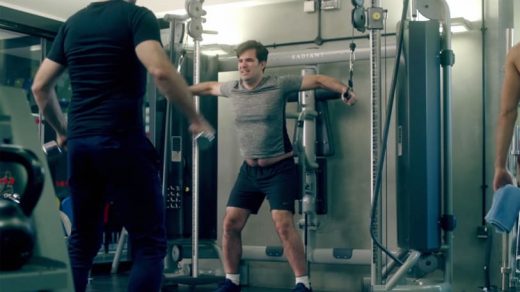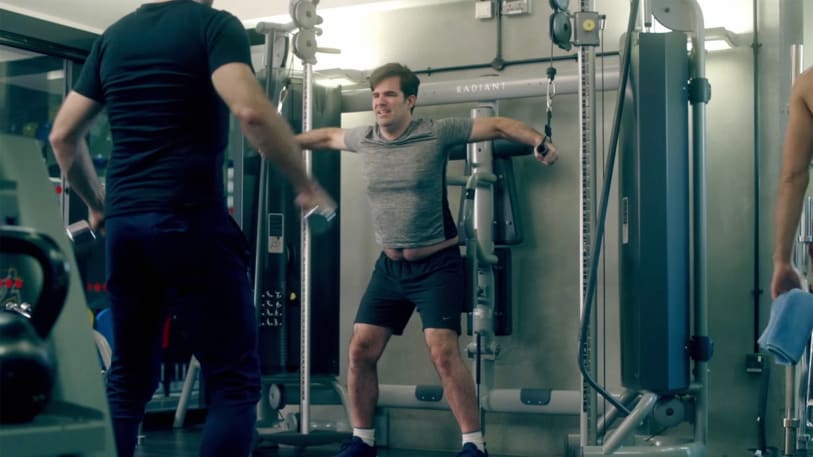Weight, Sobriety, and Trump: How Rob Delaney’s Reality Informs ‘Catastrophe’
By Joe Berkowitz , April 27, 2017
If Catastrophe makes viewers fundamentally uncomfortable, it’s a feeling they share with the show’s creators–and it comes from a very real place.
In most cringe comedies, the wincing and face-shielding come as characters ineptly navigate their careers or the dating world. With Catastrophe, however, the leads are married with two kids, and the discomfort stems from the kind of lived-in tensions that flare up when two people know each other so intimately they almost resent each other for the invasion. Married life is well-trod territory for television, but what distinguishes it in this case is Catastrophe’s stomach-sinking realism. The show’s creators and stars, Rob Delaney and Sharon Horgan, lean into areas like bed farts and basement-masturbation, from which similarly premised programs often shy away. What adds an extra sheen of authenticity to the proceedings, though, is how much of their own lives Delaney and Horgan inject into the mix.
One of the more realistic elements of the show began by accident. The two creators were so used to laughing at each other’s jokes in real life, as normal friends are wont to do, they didn’t quite realize they were doing it in character, too, on the show. It seems like a minor feature, a married couple demonstrably finding each other funny. This recurring detail quickly helped set the show apart, though, from the legion of sitcoms where audience applause is piped into the austere, laughless void across which the leads lob zingers at each other.
“It wasn’t a conscious decision,” Delaney says. “I didn’t know we were doing it until people started telling us we were doing it.”
Much of the show’s remaining verisimilitude, however, is 100% deliberate. Both creators plug in details from their own lives, such as their actual children’s troubling ‘bitey’ phase. In the third season of the series, which already aired in the UK but arrives in the US on Amazon this Friday, Rob Delaney gets especially personal. He plays on insecurities from the present and weaknesses from his past, and it all ends up helping to make this season both funnier and more achingly real than its predecessors.
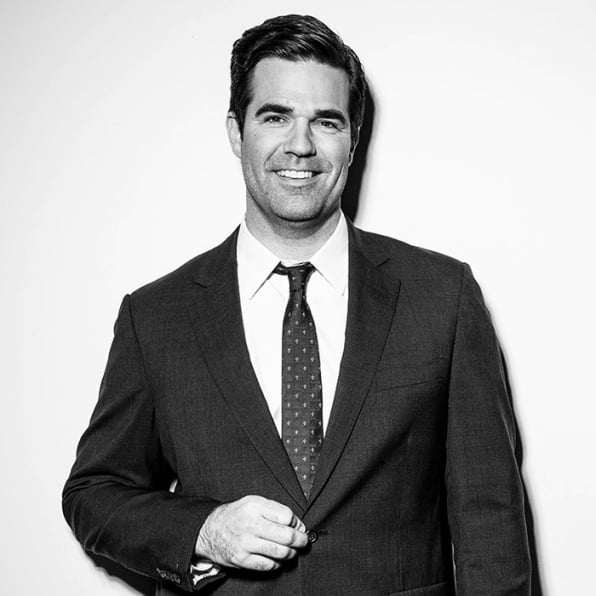
Sobriety
One of the first things a Delaney novice might learn from scouring the comedian’s earlier output is that he’s a recovered alcoholic. By the time Catastrophe came along, he’d already artistically processed the gory details leading up to his sobriety through standup, a book, and various articles. He was ready to move on. However, Horgan suggested making the character “Rob” sober in the first season. It was an idea that proved more and more prescient and valuable as the series went on.
“As things grow more difficult for [Sharon and Rob] in the second season, the sobriety thing became a really good pressure release valve; very problematic thing for Rob to deal with,” Delaney says. “So really it was just sort of a story consideration instead of ‘we’ve got something to say about this.’”
Knowing the comic’s real-life history only makes it more difficult to watch Rob fall off the wagon toward the end of the second season, though, and start the third season a long ways removed from said wagon. Marc Maron, another famously sober comic with a TV show, pulled a similar trick in his show’s final series last year. Just like Maron as well, playing out the nightmare hypothetical failed to resurrect any long-dormant demons for Delaney.
“Maybe because I’ve been sober for 15 years and I genuinely have no desire to drink, it didn’t feel like either dangerous or drinking tourism,” he says. “In fact, I would say the drunk scenes were a tiny bit more fun than your average scene to act in.”
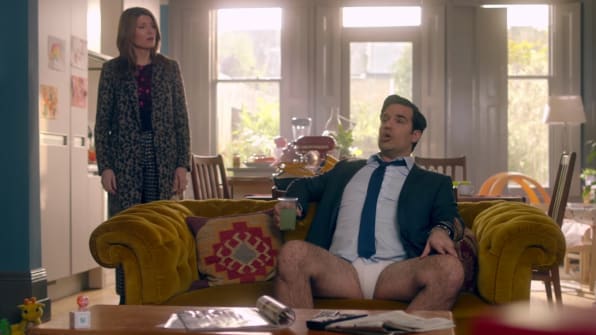
Weight
There’s an insidious disease that affects certain humans as we age, the primary symptom being sudden, sustained weight gain if we don’t work out and eat well literally all the time. Rob Delaney counts himself among the many afflicted. He began to notice recently that despite a vigorous exercise regimen, his lifelong eat-whatever ethos had begun to fail him. At a certain point (on the bathroom scale), he decided to actually address it on the show. Delaney is 6’3″ with proportionate brawn, so it won’t be immediately apparent to viewers that he’s put on weight. The subject is brought up again and again, though, throughout the new season.
“I’m kind of wrestling with [extra weight] now, and I’m joking around with it in the show,” he says. “The reason is because I think 1) it’s our sworn duty to make an entertaining comedy program and there’s laughs in this, 2) I think people can relate to it, and 3) it’s just something that’s on my mind.” He adds, “I would like to weigh less, but I don’t know how that’s gonna happen—I’ll have to talk to NASA or the jet-propulsion laboratory to find out how’s that going to take place.”
Unlike sobriety, incorporating the weight element into the show was not Sharon’s idea, but Rob’s. He brought it up early on and ran with it, in the absence of any objections from his co-star. This process is in keeping with how the two generally handle the potentially thorny issue of personal insults for each other. They write the insulting lines on the show for themselves, and not for each other.
“I remember one time, I wrote a thing for Sharon to say, and left a blank spot, and it was like ‘dialogue dialogue dialogue, Sharon put something here that you don’t like about your body, dialogue dialogue,’” Delaney says. “I didn’t want to say anything. Not my place. We’re pretty good about putting things in that sound monstrous, but we know we’re just doing it for laughs, and we wouldn’t put anything in there that the other one wouldn’t want to do or say or even think about.’
Who could come up with better insults for oneself than one’s self anyway?
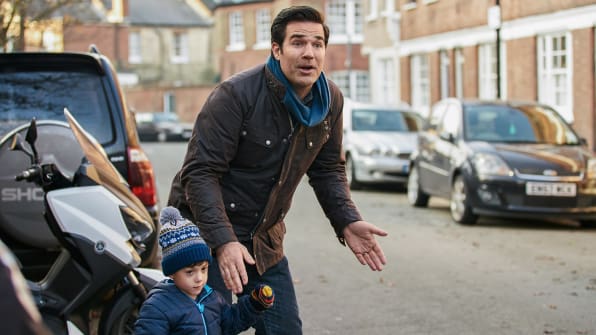
The Political Climate
Because the show’s creators have trained themselves to use the whole emotional buffalo, they had to consider current events while putting this season together. The Brexit vote went through while they were writing the season, and Trump got elected as they were shooting. When this second shoe dropped, Delaney found himself profoundly affected.
“I remember, I called a meeting in my trailer the day after Trump got elected, with Sharon and our director and producer; just to have a little powwow before we went on with the day, because I was so upset,” Delaney says.
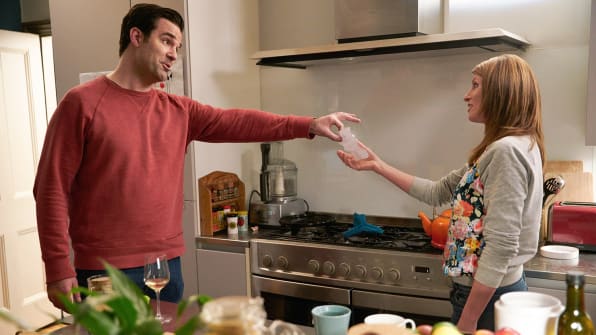
Aside from a vent session and a speed bump in keeping the day’s schedule, this meeting sparked a conversation about whether these real-world events should play a role in the season. Ultimately, they ended up mentioning both Brexit and Trump in the season opener and leaving it at that.
“We generally would like the show to exist out of time, so the goal is for it to be evergreen and not commenting on specific things,” Delaney says. “But we figured these things were big enough epochal seismic events that for at least the rest of our lives we’ll know what those things were.”
These references pop up not in a bid for topicality, but rather because they’re the kind of black swan events that create tension in a marriage and make people lose sleep. The way Delaney and Horgan chose to handle their preoccupation, with a signal flare mention at the top of the season, means that viewers might remember that this political pressure hangs in the air during the remaining episodes–another ingredient in the stew of marital anxiety the creators have expertly cooked up. Making TV’s most personal relationship comedy means leaving nothing on the table.
(80)

